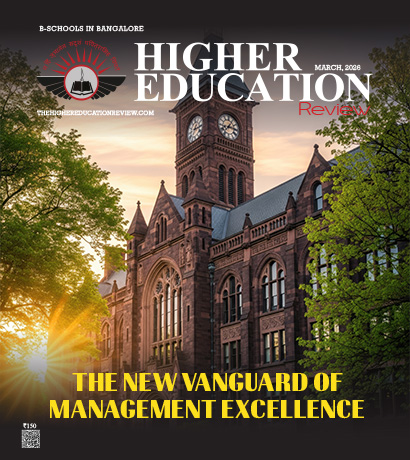CFO Aneel Gambhir Unveils Keys to Revenue, Leadership & Growth
 Aneel Gambhir, Chief Financial Officer, DTDC Express, in a discussion with Janifha Evangeline, Editor, Higher Education Review, shared his insights on the changing role of finance professionals in today's changing landscape. He discusses the challenges faced by finance graduate students moving to roles as decision-makers in business, the qualities aspiring CFOs must cultivate for effective leadership, and how storytelling, strategic thinking, and digital transformation will continue to influence the finance profession.
Aneel Gambhir, Chief Financial Officer, DTDC Express, in a discussion with Janifha Evangeline, Editor, Higher Education Review, shared his insights on the changing role of finance professionals in today's changing landscape. He discusses the challenges faced by finance graduate students moving to roles as decision-makers in business, the qualities aspiring CFOs must cultivate for effective leadership, and how storytelling, strategic thinking, and digital transformation will continue to influence the finance profession.
Aneel Gambhir is an experienced professional with 25 years of diverse experience in accounting, finance, and strategic transformation, having earned recognition as one of the Top 100 CFOs for the last five years and received the 2024 CFO of the Year award. In addition, he was recognized on the Power CFO List in 2019 and 2020.
What are the biggest challenges finance graduates face when transitioning from academic learning to corporate decision-making?
When finance graduates shift from an educational institution to a professional world, the type of knowledge and challenges change dramatically. In an educational context, knowledge tends to be fairly structured and well-defined. However, in the real world, individuals must know how to handle situations of uncertainty and incompleteness of information or partial information. Additionally, professionals regularly make decisions and evaluate situations while dealing with multiple constraints, such as limited resources and opposing social, human, and professional factors. Such skills become particularly important for individuals who are moving from an educational environment to the professional business world.
What advice would you give aspiring CFOs about navigating their growth path from entry level roles to senior leadership?
Businesses are continuously evolving, and the finance function has different verticals such as accounting, audit, FP&A, and treasury. For individuals looking to move into a leadership role in finance, it is important to understand and experience the differences between functions while also professionally navigating the relationships with various stakeholders in the finance function.
Beyond functional expertise, cultivating strategic thinking is vital. A future leader must be able to extract actionable insights from the team’s financial data, interpret those numbers and present a compelling story that informs decision-making. Furthermore, cross-functional collaboration is essential for achieving senior level roles in leadership, as it will align various parts of the organization. Altogether, functional expertise, strategic insight and collaborative capabilities are three key areas to be focused on by any future finance leader.
What habits of career decisions do you believe were the biggest contributors to your success as a CFO?
In a professional setting, individuals often face a choice in how they approach their work. The straightforward way is to perform work as defined by standard operating procedures (SOPs). The more impactful approach is to experiment and explore actions beyond the SOP, showing curiosity, inquiring, and willing to expand learning not only about work function or vertical but about horizontal areas, especially in operations. Consistently pursuing this broader exposure and learning beyond the core finance function can significantly contribute to personal growth and prepare an individual for advancement within the organization.
Is there a book, mentor, or life lesson that has significantly shaped your leadership and financial management style?
Rather than relying solely on mentorship, gaining hands-on experience is an important role in finance professional’s growth. Finance jobs have the advantage of allowing employees to work with numbers, but it is often said that numbers are merely a representation of a story. How this story develops, unfolds, and ultimately translates into a narrative is often dependent on individuals and their decisions.
As a result, it is important to extract the numbers to develop meaningful insights and effective storytelling capabilities. Storytelling supports sustainable career progression and improves one’s ability to progress in a position. Aspiring finance professionals must go beyond numerical skills and learn to communicate the story behind the numbers, enabling stronger stakeholder engagement and smarter decision-making.
What has been the most challenging financial position of your career and what did you learn from it?
A difficult decision involved right-sizing the organization. While the human impact on employees was significant, it was necessary to ensure the long-term sustainability of the organization so that the majority could continue working and the organization could grow. Determining where to reduce headcount in the interest of the organization’s future was extremely difficult. However, taking this decision helped the organization remain profitable and secure continued employment for the larger workforce.
What’s your go-to approach for boosting a company's revenue?
The general framework involves first understanding the company’s value drivers, and how customers view value in the company’s offerings. Understanding which value drivers customers will be willing to pay for, the effort can be directed to improve the offering and customer experience on the value drivers. This approach driving the future of the company, increase its revenues and enables enduring sustainability. In contrast, without focusing on the organization’s value drivers, short-term achievements may not translate into sustainable growth. If the organization continuously focuses on and invests in the organization’s value drivers, sustained revenue growth, and long-term organizational success will be achieved.
How do you handle pressure when numbers don't meet expectations in your organization?
Performance pressure is a prevalent issue, especially in finance during quarterly reporting periods. It is essential to identify the causes of this pressure. Some factors are controllable, such as internal processes, systems, or people-related issues, while others are uncontrollable, including geopolitical events or unforeseen situations. Controllable factors should be addressed and resolved proactively. For uncontrollable situations, transparent communication with any pertinent stakeholders is key. Transparency provides stakeholders the reassurance that the organization is committed to excellence, maintains confidence in the organization, and strengthens the belief that performance will improve over time.
How do you decide between short term gains and long term growth?
Decisions should be assessed not only for their short-term benefits but also for their long-term benefits. Even if long-term profitability is lower in relation to short-term profitability, solutions that create long-term benefits for the organization are preferable to decisions that deliver only excessive short-term profits that may be unsustainable or harmful from an environmental point of view.
As an example, in a logistics company, network optimization involves the adjustment of vehicle routes and the use of an improved amount of vehicles in the business. This reduction provides immediate cost savings while simultaneously decreasing the environmental footprint, supporting sustainable business practices. Balancing both short-term savings and long-term sustainability will ensure that business practices are aligned with both profit and responsible operational practices.
How do your personal interests or your hobbies outside work influence the way you approach challenges in your professional life?
There are many ways to learn outside of the workplace, and sports provide a close parallel to business. Business involves working under pressure, remaining calm while making decisions, taking risks, and showing resilience, all of which are also present in sports. For instance, sports offer valuable lessons in determination, risk management, teamwork, and decision-making. Likewise, some films offer practical insights in real-world situations that inform decision-making, promote professional development, and are key examples of best practices.
If you had to give one revenue growth tip to a new CFO, what would it be?
For a new CFO, some of the best advice is to maintain flexibility, staying observant, and keep learning. Unlearning and re-learning are more essential than ever as the world is constantly changing. A key part of being successful is working collaboratively and communicating openly with all stakeholders.
Do you have any other additional information to add or do you want to highlight anything in particular in this article?
The importance of technological and digital transformation should be recognized along with the hard and soft elements of finance and people management. The implementation of any digital solution impacts every part of the business. A successful transformation involves initiatives broken down in phases to manageable, received approval from key stakeholders, and focused on change management before implementation. Change management is often inadequate, stakeholders are not engaged, or collaboration is lacking, even though each digital solution plays a role across various functions.

